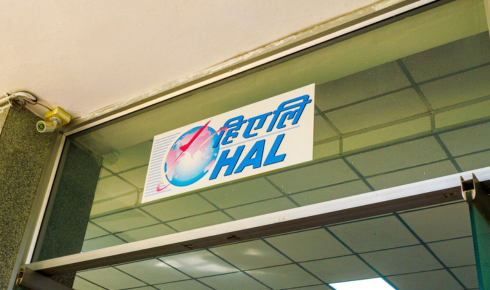
HAL share price
In the world of investing, Exchange-Traded Funds (ETFs) have emerged as a popular choice for both novice and seasoned investors. HDFC SKY, offered by HDFC Securities, provides a comprehensive platform for investors to access a wide range of investment options, including ETFs. This article delves into the advantages of ETFs and crucial insights for investors considering adding them to their portfolio.
Understanding ETFs: A Beginner’s Guide
Understanding ETFs: A Beginner’s Guide is an essential resource for novice investors looking to navigate the world of Exchange-Traded Funds (ETFs) through HDFC SKY by HDFC Securities. This modern discount-broking platform provides a user-friendly interface that offers seamless access to a wide range of investment options, including Indian equities, ETFs, mutual funds, IPOs, derivatives, commodities, currencies, and global stocks. With zero account-opening charges and a flat ₹20-per-order brokerage fee, investors can start building a diversified portfolio without worrying about high fees eating into their returns. Additionally, the platform’s lifetime free ETFs feature allows investors to maximize their investment potential by reducing costs associated with trading ETFs.
ETFs offer a flexible and efficient way to invest, reflecting the broader market or specific sectors with ease. By leveraging the comprehensive tools available on HDFC SKY, investors can confidently access and trade ETFs while enjoying a streamlined process designed to enhance portfolio growth and financial knowledge. Users can explore tailored strategies that suit their risk appetite and investment goals, allowing them to capitalize on market opportunities efficiently. With HDFC SKY’s robust support, beginners are poised to access new potential in the world of ETFs.
HDFC SKY stands out among its competitors by offering interest-bearing margin trading, expert research, and intuitive tools that empower investors to make informed decisions about their investments. Through this beginner’s guide, investors can gain a comprehensive understanding of ETFs, their benefits, risks, and how they can be effectively utilized to achieve their financial goals. Whether investors are looking to gain exposure to specific sectors, asset classes, or markets, ETFs offer a convenient and cost-effective way to diversify their portfolios and potentially enhance their returns. This guide serves as a valuable resource for beginners who are eager to explore the world of ETF investing and take their first steps towards building a successful investment strategy.
ETFs vs. Mutual Funds: Key Differences
Exchange-Traded Funds (ETFs) and Mutual Funds are both popular investment options, but they have key differences that set them apart. One of the main distinctions is their structure. ETFs are traded on stock exchanges, just like individual stocks, allowing investors to buy and sell them throughout the trading day at market prices. On the other hand, mutual funds are bought and sold based on their Net Asset Value (NAV) at the end of the trading day, as they are not traded on exchanges. This key difference in structure impacts the liquidity and pricing of these investment vehicles. Additionally, ETFs typically have lower expense ratios compared to mutual funds, making them a cost-effective option for investors looking to minimize fees and expenses.
Another significant difference between ETFs and Mutual Funds is their tax efficiency. ETFs are known for their tax advantages due to their unique structure, which allows for in-kind redemptions that can help minimize capital gains taxes. Mutual funds, on the other hand, are subject to capital gains taxes when the fund manager sells securities within the fund, which can result in tax implications for investors, even if they did not sell their own shares. This tax efficiency of ETFs can be particularly beneficial for long-term investors looking to maximize their after-tax returns. Understanding these key differences can help investors make informed decisions when choosing between ETFs and Mutual Funds for their investment portfolios.
MTF on ETFs provides investors with increased flexibility and leverage. By utilizing margin trading, investors can potentially enhance their returns by borrowing funds to increase their exposure to ETF positions. However, it is crucial to understand the risks involved, as leverage can magnify both gains and losses, affecting overall investment performance.
Benefits of Diversification with ETFs
Diversification with Exchange-Traded Funds (ETFs) offers investors a wide range of benefits. One of the key advantages is the ability to easily access a diversified portfolio of assets with just one investment. ETFs provide exposure to various sectors, regions, and asset classes, allowing investors to spread their risk across different areas of the market. This diversification can help reduce the impact of volatility in a particular stock or sector on the overall portfolio performance. Additionally, ETFs offer transparency, as their holdings are disclosed daily, enabling investors to know exactly what they are investing in. This transparency helps investors make informed decisions about their portfolio allocation.
HDFC SKY by HDFC Securities enhances the benefits of diversification with ETFs by providing a modern discount-broking platform that offers seamless access to a wide range of investment options. With zero account-opening charges and a flat brokerage fee per order, investors can efficiently build a diversified portfolio without incurring high costs. The platform’s focus on ETFs, mutual funds, and other investment products allows investors to easily create a well-rounded investment strategy that suits their risk tolerance and financial goals. Moreover, the expert research and intuitive tools provided by HDFC SKY empower investors to make informed decisions and optimize their portfolio diversification for long-term growth.
Examining ETF Costs and Fees
When examining ETF costs and fees within the HDFC SKY platform by HDFC Securities, investors can benefit from a transparent fee structure that allows for cost-effective investment opportunities. With zero account-opening charges and a flat ₹20-per-order brokerage fee, investors can make trades without worrying about high transaction costs eating into their returns. Additionally, the platform offers lifetime free ETFs, providing a valuable opportunity for investors to build a diversified portfolio without incurring additional fees. This cost-effective approach to ETF investing can help investors maximize their returns and grow their wealth over time.
Moreover, HDFC SKY also offers interest-bearing margin trading, allowing investors to leverage their positions and potentially enhance their returns. The expert research and intuitive tools provided by the platform further empower investors to make informed decisions, ultimately leading to better investment outcomes. By keeping costs low and offering valuable features, HDFC SKY enables investors to access a wide range of investment options, including Indian equities, mutual funds, IPOs, derivatives, commodities, currencies, and global stocks, all while prioritizing affordability and transparency in its fee structure.
ETF Liquidity: Why It Matters
ETF liquidity is a crucial factor to consider for investors looking to trade Exchange-Traded Funds (ETFs). Liquidity refers to the ease with which an ETF can be bought or sold on the market without significantly impacting its price. A highly liquid ETF typically has a high trading volume, narrow bid-ask spreads, and minimal price fluctuations. Liquidity matters because it directly affects the cost and efficiency of trading ETFs. A liquid ETF allows investors to enter and exit positions quickly and at a fair price, reducing the risk of slippage and ensuring that the market accurately reflects the ETF’s underlying value. Moreover, liquidity provides flexibility, enabling investors to react promptly to market conditions and manage their portfolios effectively.
HAL share price plays a significant role in influencing the decisions of investors considering exposure to this stock through ETFs. As exchange-traded products hinge on both underlying asset liquidity and market behavior, understanding share price dynamics can provide insights into potential volatility and trading opportunities. Moreover, share prices directly correlate with investor sentiment.
In the context of HDFC SKY by HDFC Securities, access to liquid ETFs can enhance the overall trading experience for investors. With a modern discount-broking platform like HDFC SKY, investors can benefit from seamless access to a wide range of ETFs with high liquidity. This means that investors can trade ETFs efficiently, with minimal impact on prices and transaction costs. By offering lifetime free ETFs and expert research, HDFC SKY empowers investors to make informed decisions and build diversified portfolios using liquid ETFs. The combination of low-cost trading, liquidity, and valuable research insights makes ETF trading on HDFC SKY an attractive option for investors seeking to optimize their investment strategies.
Tracking Index Performance with ETFs
Tracking index performance with ETFs is a popular investment strategy due to its simplicity and efficiency. ETFs, or exchange-traded funds, are investment funds that are traded on stock exchanges, mirroring the performance of a specific index. Investors can easily track the performance of popular indices like the Nifty 50 or S&P 500 by investing in ETFs that replicate these indices. HDFC SKY, offered by HDFC Securities, provides investors with access to a wide range of ETFs, allowing them to diversify their portfolios and benefit from the performance of various indices.
Investing in ETFs through HDFC SKY offers investors the convenience of easily monitoring and tracking the performance of different indices. With zero account-opening charges and a flat brokerage fee per order, investors can efficiently build a diversified portfolio by investing in a variety of ETFs. Additionally, HDFC SKY provides expert research and intuitive tools that help investors make informed decisions about their ETF investments. The platform’s offering of lifetime free ETFs and interest-bearing margin trading further enhances the attractiveness of using ETFs to track index performance for investors looking for a cost-effective and efficient investment strategy.
Tax Efficiency of ETFs
ETFs, or exchange-traded funds, are known for their tax efficiency, making them an attractive investment option for many investors. One of the key reasons why ETFs are tax-efficient is their unique structure. ETFs are structured as open-end funds and typically have in-kind creation and redemption processes. This allows ETFs to minimize capital gains and tax implications compared to mutual funds, which often incur capital gains taxes when investors redeem their shares. Additionally, ETFs tend to have lower portfolio turnover rates compared to actively managed mutual funds, reducing the likelihood of generating capital gains that are taxable to investors. Moreover, ETFs also have the advantage of not distributing capital gains to investors as frequently as mutual funds, further enhancing their tax efficiency.
Investing in ETFs through platforms like HDFC SKY by HDFC Securities can provide investors with access to a diverse range of tax-efficient investment options. With zero account-opening charges and lifetime free ETFs, investors can benefit from cost-effective investing while also taking advantage of the tax-efficient nature of ETFs. Furthermore, HDFC SKY offers expert research and intuitive tools that can help investors make informed decisions when building a tax-efficient ETF portfolio. By leveraging the tax benefits of ETFs and utilizing the resources provided by platforms like HDFC SKY, investors can optimize their investment strategies to achieve long-term financial goals while minimizing tax liabilities.
ETFs for Sector and Industry Exposure
ETFs provide investors with a convenient way to gain exposure to specific sectors and industries within the stock market. By investing in ETFs focused on a particular sector, such as technology or healthcare, investors can benefit from diversification while targeting their investment in areas they believe hold strong growth potential. HDFC SKY, offered by HDFC Securities, allows investors to easily access a wide range of ETFs that cater to various sectors and industries in the Indian equities market. This platform offers a cost-effective and user-friendly way for investors to build a well-rounded portfolio with exposure to different sectors without the need to pick individual stocks.
Investing in sector-specific ETFs through HDFC SKY can provide investors with a way to capitalize on the growth opportunities presented by specific industries or sectors, without the need for in-depth market knowledge or time-consuming research. By offering lifetime free ETFs and a flat brokerage fee per order, HDFC SKY makes it easier for investors to access and trade these instruments efficiently. Additionally, the platform provides expert research and intuitive tools to help investors make informed decisions about their sector and industry exposure, further enhancing their investment experience and potentially improving their portfolio performance.
Trading online app accessibility through HDFC SKY ensures that investors have constant access to their portfolios, enabling them to respond swiftly to market changes. Real-time data and analytics top off the package, facilitating informed decision-making. Thus, users are empowered to effectively manage their investments and optimize their financial outcomes.
Risks and Considerations of Investing in ETFs
Investing in ETFs can offer a range of benefits, but it is essential to consider the associated risks. One primary risk is market volatility. ETFs are traded on exchanges like stocks, and their prices can fluctuate throughout the trading day. This volatility can expose investors to the risk of significant losses, especially during times of market turbulence. Additionally, since ETFs track specific indexes or sectors, they are susceptible to the performance of those underlying assets. If the index or sector experiences a downturn, the value of the ETF can also decline. Furthermore, some ETFs use leverage or derivatives to amplify returns, which can increase the level of risk and potential losses for investors.
Another consideration when investing in ETFs is liquidity risk. While ETFs are generally considered to be liquid investments, there may be instances where the market for a particular ETF is not as active, leading to wider bid-ask spreads and potentially higher trading costs. This lack of liquidity can make it challenging to exit a position quickly, especially during times of market stress. Additionally, investors should be aware of tracking error, which refers to the discrepancy between the ETF’s performance and the performance of its underlying index. This can occur due to various factors, including fees, trading costs, and the fund manager’s ability to replicate the index accurately. It is crucial for investors to evaluate these risks and considerations before incorporating ETFs into their investment portfolios.
Building a Balanced Portfolio with ETFs
Building a balanced portfolio with ETFs is a smart investment strategy that can provide diversification and stability to your overall financial holdings. HDFC SKY, offered by HDFC Securities, is a cutting-edge discount-broking platform that enables investors to easily access a wide range of investment options, including Indian equities, ETFs, mutual funds, IPOs, derivatives, commodities, currencies, and global stocks. With zero account-opening charges and a flat brokerage fee of ₹20 per order, lifetime free ETFs, and interest-bearing margin trading, HDFC SKY provides cost-effective solutions for building a diversified portfolio. Additionally, the platform offers expert research insights and intuitive tools to help investors make informed decisions and optimize their investment strategies.
ETFs, or exchange-traded funds, offer investors a convenient way to invest in a basket of securities that track a specific index, sector, or asset class. By incorporating ETFs into your investment portfolio through HDFC SKY, you can achieve broad market exposure and reduce individual stock risk. With the flexibility to trade ETFs like individual stocks, investors can easily adjust their asset allocation and rebalance their portfolios according to their investment goals and risk tolerance. Whether you are a novice investor looking to start building a diversified portfolio or a seasoned trader seeking cost-effective investment options, HDFC SKY’s user-friendly interface and comprehensive range of ETFs make it a valuable platform for constructing a well-rounded investment portfolio.






